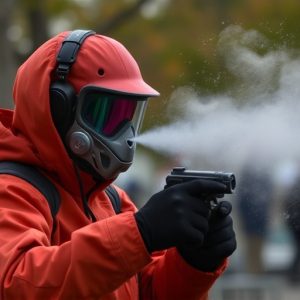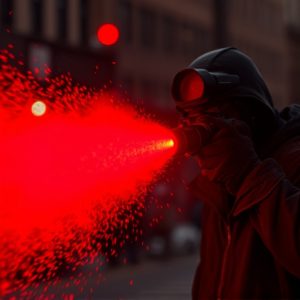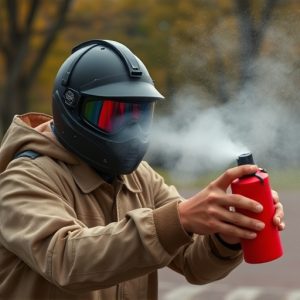Decoding the Impact of Pepper Spray: Immediate to Long-Term Effects and Legal Implications
Pepper spray contains capsaicin and is used for self-defense and crowd control due to its potent im…….
Pepper spray contains capsaicin and is used for self-defense and crowd control due to its potent impact on vision, causing an intense burning sensation through the trigeminal nerves, leading to involuntary eye closure and temporary blindness, commonly known as 'blindness.' This condition involves tear production, conjunctival swelling, and can last up to 45 minutes or longer, depending on concentration, exposure duration, and environmental factors. Contrary to misconceptions, pepper spray does not cause permanent blindness but can temporarily impair vision significantly. It's essential for users and law enforcement to understand its effects for safe application and to comply with local laws regarding possession and use. Pepper spray can indeed temporarily blind an individual, highlighting the need for caution and preparedness when encountering this irritant. Safety measures include protective eyewear during deployment and having an antidote like water or a wet cloth ready to counteract its effects. Understanding both its immediate impact and legal considerations is crucial for responsible use of pepper spray as a non-lethal self-defense tool.
Exploring the potency and effects of pepper spray, this article delves into its immediate and prolonged impacts on vision and respiratory health. From the burning sensation it induces upon contact to the potential for temporary blindness as queried, “Can pepper spray blind you?” we examine the physical repercussions one might experience post-exposure. Additionally, we discuss legal aspects, safety guidelines, and measures to safeguard against its effects, ensuring a comprehensive understanding of this self-defense tool’s capabilities and risks.
Understanding Pepper Spray and Its Immediate Effects on Vision
Pepper spray, a capsaicin-based irritant, is commonly used as a non-lethal self-defense tool and law enforcement crowd control agent. Its effects on vision are immediate and potent. Upon contact with the eyes, the active component in pepper spray stimulates the trigeminal nerves, which trigger an intense burning sensation. This response can be so overwhelming that it may cause involuntary eye closure, temporarily blinding the affected individual. The intensity of this reaction varies depending on the concentration and exposure duration but can lead to a temporary loss of vision, often referred to as ‘blindness’ in colloquial terms. This phenomenon occurs because the spray interferes with the eyes’ ability to transmit visual information to the brain. The lacrimal glands are stimulated to produce an excessive amount of tears, which not only washes the irritant away but also obscures vision due to the flow of fluid across the ocular surface. Additionally, the inflammatory response induces swelling and redness of the conjunctiva, further impeding vision. The effects are usually short-lived but can persist for up to 45 minutes or more, depending on the concentration of the spray used and individual factors such as wind conditions and proximity to the discharge. It’s crucial to note that while pepper spray can cause a temporary and significant reduction in vision, it does not typically result in permanent blindness. Users and law enforcement must handle pepper spray with care to avoid accidental exposure and understand its effects for appropriate use in self-defense or crowd management scenarios.
The Short-Term Physical Impact of Pepper Spray Exposure
Exposure to pepper spray, a commonly used non-lethal irritant, can induce immediate and potent physiological effects. Upon contact with the eyes, skin, or respiratory system, capsaicin—the active component in pepper spray—stimulates pain receptors, causing intense burning sensations that can lead to temporary blindness. The severity of this condition, often referred to as “flash-blindness,” is a reflexive response to the intense irritation. This discomfort can render individuals momentarily incapacitated, struggling to see as their eyes involuntarily close in an attempt to escape the agony. Within minutes, lacrimal fluid—the fluid responsible for lubricating the eyes—floods the ocular surface in a desperate effort to dilute and flush out the irritant. The skin may also exhibit signs of exposure with redness, swelling, and a burning sensation that can persist for up to 45 minutes or more. Respiratory effects include coughing, difficulty breathing, and an acute sensation of choking, as the spray’s particles are inhaled into the lungs, causing irritation and mucous production. These symptoms underscore the incapacitating potential of pepper spray, making it a formidable tool for self-defense or crowd control when used appropriately. The effects typically subside as the capsaicin is washed away or neutralized, but the duration and severity can vary depending on the concentration of the spray and the level of exposure. It is crucial for individuals exposed to pepper spray to seek immediate medical attention to alleviate symptoms and prevent potential complications.
Long-Term Consequences of Pepper Spray on the Eyes and Respiratory System
Exposure to pepper spray, a common non-lethal irritant used in self-defense and crowd control, can have immediate as well as long-term effects on both the eyes and respiratory system. The ocular consequences of pepper spray exposure are particularly noteworthy; while temporary blindness may occur due to the intense burning sensation in the eyes, prolonged exposure can lead to more serious issues such as corneal abrasions or swelling of the eyelids and conjunctiva. In some cases, if the spray comes into contact with the eyes for an extended period, it can cause damage that may take days or even weeks to fully heal. The effects on the respiratory system are equally significant; the spray’s capsaicin content can trigger a cascade of reactions including inflammation and mucus production in the airways, leading to difficulty breathing and coughing. Individuals who have pre-existing respiratory conditions may experience exacerbations that could potentially last beyond the immediate aftermath of exposure. It is crucial for users and those affected by pepper spray to understand these long-term implications to take appropriate safety measures and to seek medical attention when necessary, as the full extent of the spray’s impact on the body can be profound and enduring. Regular eye examinations post-exposure are advisable to monitor any changes or potential permanent damage that may arise, particularly concerning visual acuity and ocular health.
Legal Considerations, Safety Precautions, and Preventive Measures Against Pepper Spray Effects
When considering the use of pepper spray, legal frameworks play a pivotal role in its application and ownership. Pepper spray is recognized as a less-lethal self-defense tool in many jurisdictions; however, its possession and usage are subject to stringent regulations. It’s crucial to familiarize oneself with local laws regarding the purchase, carrying, and deployment of pepper spray to avoid legal repercussions that may arise from misuse or unauthorized possession. For instance, certain regions restrict the strength of pepper spray available for civilian use, and in some places, it is illegal to own without a permit.
In terms of safety precautions and preventive measures against the effects of pepper spray, understanding its impact on the human body is essential. Pepper spray, commonly known as OC (oleorecinocapsicin) spray, can cause temporary blindness by irritating the eyes, leading to severe tearing, pain, and potential temporary vision loss. To mitigate such effects, it is advisable to wear protective eyewear when in proximity to its use. Additionally, if exposed to pepper spray, immediate action should be taken to remove contaminated clothing, move to a safe area, and flush the affected eyes with water for at least 15-30 minutes. It’s also important to have an antidote readily available, such as a wet cloth or eyewash solution, to counteract the effects. First responders are equipped to handle exposures and can provide the necessary care to reverse the symptoms. Always prioritize safety through informed use, proper storage, and preparedness for accidents or self-defense situations involving pepper spray.


